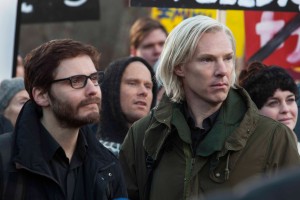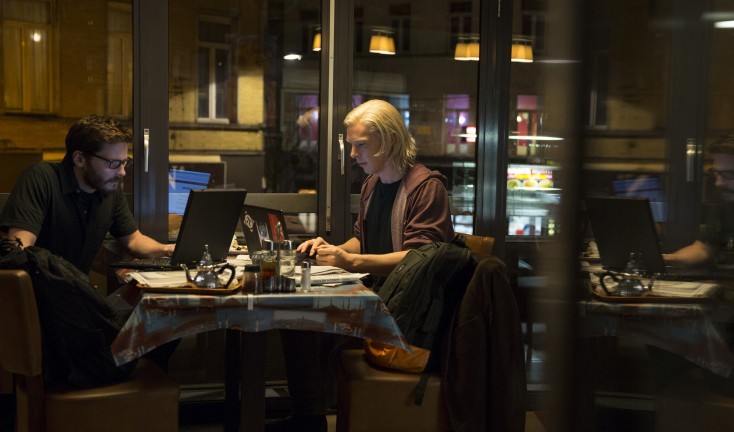
Daniel Brühl (left) and Benedict Cumberbatch star as Daniel Domscheit-Berg and Julian Assange, respectively, in DreamWorks Pictures’ “The Fifth Estate.” ©DreamWorks II Distribution Co., LLC. CR: Frank Connor.
By ANGELA DAWSON
Front Row Features
TORONTO—In just a few years, Benedict Cumberbatch has gone from a British supporting actor with a whimsical name to one of the most in-demand Hollywood actors.
Having first invaded American television in the BBC drama “Sherlock,” Cumberbatch has moved up to the big screen in blockbusters, playing the antagonist Khan in “Star Trek Into Darkness” and the frightening Necromancer in “The Hobbit: An Unexpected Journey” (a role he reprises in the upcoming sequel “The Hobbit: The Desolation of Smaug.”) The 37-year-old also plays a Southern slaveholder in the epic drama “12 Years a Slave,” and he co-stars opposite the grand dames of Hollywood Meryl Streep and Julia Roberts in the black comedy “August: Osage County.”
But the role Cumberbatch is getting the most notice for is his depiction of WikiLeaks founder Julian Assange in “The Fifth Estate.” Assange has publicly blasted the Bill Condon-directed film as “irresponsible, counterproductive and harmful.”
Cumberbatch recently spoke about career and playing the controversial Assange, who has released his own film, a documentary called “Mediastan,” in response to Hollywood version.
Q: Daniel Bruhl, who plays Assange’s right hand man Daniel Domscheit-Berg, described you as a Sherlock in real life, who can remember every detail.
Cumberbatch: He’s very flattering, but no, I’m a far way off his brilliance.
Q: You’ve got so much coming out now: this, “Sherlock Holmes” and “The Hobbit” sequel, “12 Years a Slave”…
Cumberbatch: It’s really exciting.
Q: Have you had even a week off in the past year?
Cumberbatch: I had 10 days in the summer, but they went by in a bit of a blur. It’s been a very, very busy year. It’s an embarrassment of riches and I’m loath to complain about it. I’m really enjoying it, and, as my erstwhile character Sherlock says, a new job is as good as a change, or change is as good as a rest even. I think that’s what he says. He says it in “The Sign of the Four.” You can look it up and see how badly I can misquote him, let alone behave like him. But yeah, it’s been an amazing time at the moment, and I’m really enjoying it.
Q: Did you enjoy your white hair in this movie?
Cumberbatch: I kind of did. The eyes were a little bit more arduous. I quite liked it. I had a kind of skunky badger thing. I did love the fact that for about six months last year, both in “August: Osage County” and in “12 Years a Slave,” I had my own color hair, which is great. But I really quite enjoyed putting the wigs on.
Q: Does it take you there when you put on the wig?
Cumberbatch: It does a bit. The first time I put it on and came into the room, people were like “Oh, wow!” That’s a great thrill. You think, “OK, well, something’s working.” (Assange has) got softer features than me. I’m a little more angular, which sometimes makes me look a little weird and creepy with some of the wigs, and that’s not the intention at all. I just think that’s the way I look. I’ve got a longer face. He’s got a rounder face, so it was a challenge. The harder thing was the contact lenses because I’ve never worn them before.
Q: How about getting his accent?
Cumberbatch: With the accent and the dialect, and also the slight lisp as well, the hard ridge lisp. That was a huge change. I had a fantastic dialect coach called Sarah Shepherd that helped me with that.
Q: Did you talk to Bill Condon about making Assange somebody that the audience wouldn’t hate?
Cumberbatch: It was important to me to portray him as a three-dimensional human being and not get into a slagging match about whether he was good or bad. I wanted to portray human characteristics about a man at the forefront of an incredible media revolution, with incredible ideas, whose controversy was borne out of that primarily and not get bogged down in character assassinations, which is so easy to come by, because people want a headline. They want to grab something and run with a two-dimensional story. I like the way the film tackles that and I like the way that Julian talks about his appraisal in The New York Times as getting equal bidding for the state of his socks, as for collateral murder, kind of highlights that idiocy. So it was important to me to portray him in a balanced way.
Q: Julian attempted to dissuade you from doing the project. Can you describe your communications with him and what ways those informed you?
Cumberbatch: I tried to justify my reasons for doing the project and that was where that ended.
Q: You weren’t going to step aside because Julian asked you not to do it?
Cumberbatch: It mattered to me a lot that he felt so passionately, but I wanted to persuade him that it wasn’t necessarily going to be as bad as he feared it would be, both from the script he’d had leaked to him, which is a very old draft. I don’t even think I ever saw that draft, but yeah.
Q: Did you communicate by email?
Cumberbatch: Yeah, it was private between us.
Q: The film is told from Daniel’s perspective and through his filter. How challenging was that to you as you were kind of putting your character together and how you wanted to balance that?
Cumberbatch: From the perspective of the film, none, because you concentrate on how you are in the moment. If people are commenting about your character or reacting to your character, that’s drama. It’s not something you worry about.
Q: What research did you do for Assange?
Cumberbatch: As much as I could. A lot. An awful lot. It was important to concentrate on what we were doing, which is making a film, a dramatization of events. So while it was informative, it was important for me to always remember that this is a perspective, not the perspective. The film’s central message is there’s no such thing as objective truth. There’s always going to be a personal truth and you have to take the inspiration of this film is that it is about people journalism, it’s about something that’s powered by individuals, it’s not about a consensus, and I think that’s probably how the film will be greeted and reacted to, and I mean, that’s no bad thing.
Q: Do you see a link between Julian, who is so brilliant, and Sherlock, who is also brilliant and perceived as arrogant? He doesn’t relate to people.
Cumberbatch: I think they’re very, very different characters for obvious reasons. If you’re saying that I conform to a type in my work, then yeah, there are crossovers, I’m sure, but have a look at “Little” Charles in “August: Osage County” and William Ford (in “12 Years a Slave”) as well, because they’re nothing like Julian or Sherlock. That’s not me being defensive. That’s me explaining that I think there are huge differences between Sherlock and Julian.
Q: You have a number of female fans that have an unusual nickname.
Cumberbatch: They’re actually changing themselves to Cumber-collectors—most of them now. I’ve gone down the route of reversing the sort of negative backlash of however many years of feminism. It was a little bit worrying, and I didn’t ask for this sort of subservient demeaning collective noun, and they’ve very kindly said, “Oh, no, it was only a joke.” It’s best to make a slightly more politically correct joke about it in my name. It’s one of the least offensive nicknames I have on the Internet, if you care to Google it, there’s all sorts of nonsense, but I have had that since high school, so I’ve got quite a thick skin about that.
Q: How do you feel about this new level of success and celebrity you’ve obtained?
Cumberbatch: Wow, this is another interview. This is like a profile suddenly, isn’t it?




